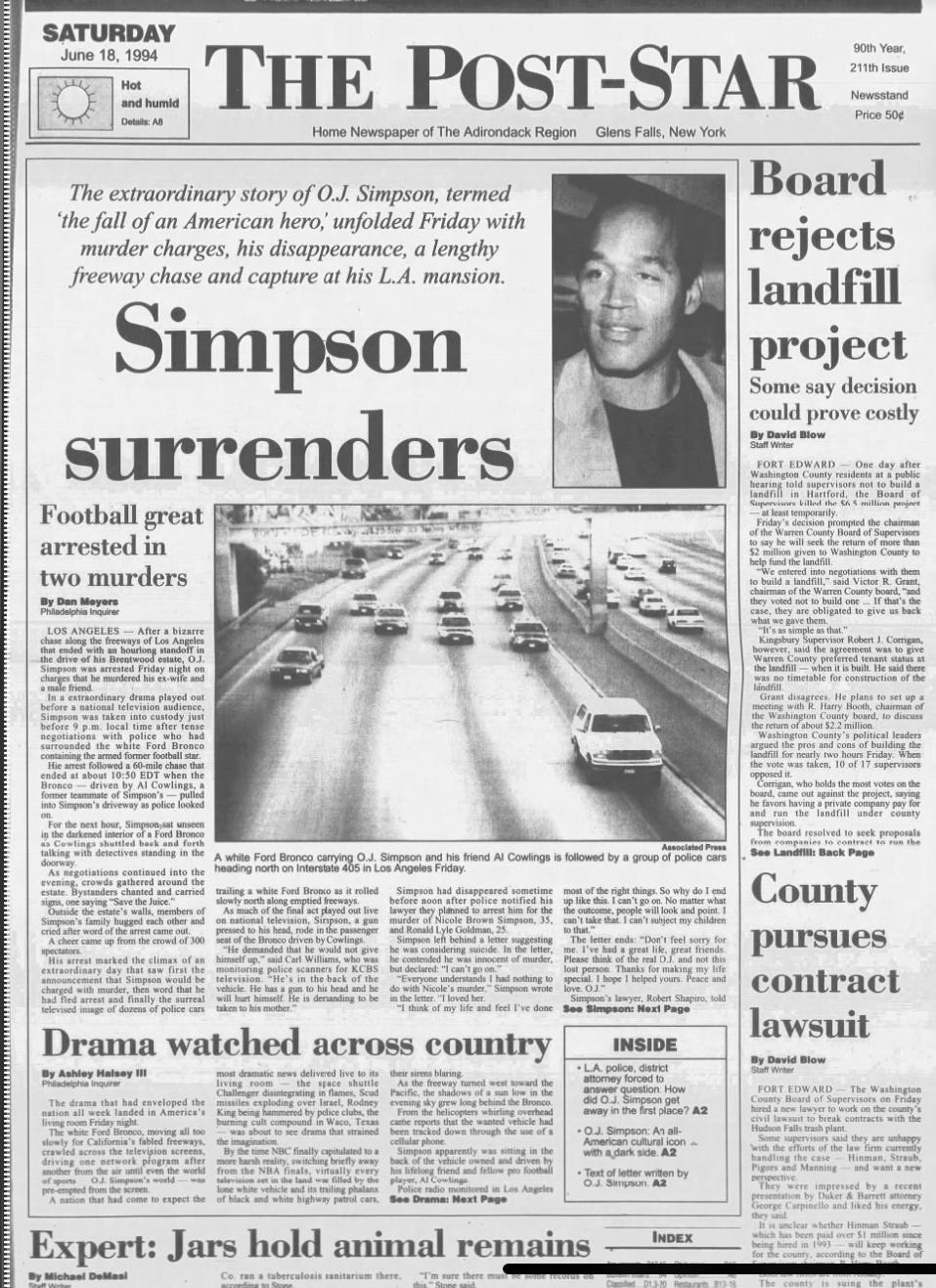Smartphones have become a psychological minefield for the young
State Legislature considering bill to fight deep fakes in politics
A Long Island assemblyman introduced a bill last week that "prohibits students from possessing cellphones during classroom instruction."
The knee jerk reaction from many - but especially parents - will almost certainly be concern about safety, and possibly convenience.
Their child cannot possibly survive without being able to immediately contact a parent.
Yes, the sarcasm is intended, but there are other considerations.
What if their child forgot their lunch?
What if they left their violin at home (I have personally been the victim of this one multiple times).
Or more darkly, what if there is a school shooting?
But there are even darker forces at work here according to New York University social psychologist Jonathan Haidt.
Haidt traces a "tidal wave" of ills of Generation Z - those born after 1995 - with the arrival of smartphones in 2010 in what he calls "phone-based childhood."
In Haidt's new book The Anxious Generation he says that after a decade of stability or improvement in mental health statistics for adolescents, it plunged in the early 2010s with rates of depression, anxiety, self-harm and suicide rising sharply. In some cases the rates more than doubled.
Other countries saw the same thing with Generation Z teens becoming the first generation "to go through puberty with a portal in their pockets that called them away from people nearby and into an alternative universe."
Haidt argues there are two colliding forces at work here.
The first was the "safetyism" of paranoid parenting that began in the 1980s and was finally "wiped out" by the arrival of "phone-based childhood" in the 2010s.
George Will, the conservative columnist for The Washington Post, summed it up this way in a recent column:
"Phone-based childhood displaced play-based childhood and its unsupervised conversing, touching and negotiating the small-scale frictions and setbacks that prepare children for adulthood. Fearful parents, convinced the real world is comprehensively menacing (and worried about over broad child endangerment laws) will not allow their children to walk alone to a nearby store. But they allow their children unrestricted wallowing in the internet, especially social media."
That cuts to the heart of the matter.
To this day, you see it on every local street corner and school where parents wait with their children at bus stops or walk them to the door of the schools with an exaggerated "stranger danger" of the real world.
Add in a smartphone in every backpack and Haidt calls it the "great rewiring of childhood."
It interfered with children's social and neurological development and led to problems of sleep deprivation, attention fragmentation, addiction, loneliness, social contagion, social comparison and perfectionism.
Haidt now calls it a "public health emergency."
So what to do?
Haidt calls for "more unsupervised play and childhood independence."
He demands "no smartphones before high school."
And "no social media before 16."
Will reminds us in his column there has been panic about "cultural phenomena" in the past including the evils of comic books, too much television and video games.
Can smartphones really be to blame for our children's woes?
Keith Brown, the Long Island assemblyman from Commack, believes so.
“Research appears to overwhelmingly support the notion that students who spend more time on their phones do worse in school, distract other students around them, and feel worse about their life,” Brown said in justifying his recent legislation banning cell phones. “This bill will help to eliminate this phone usage problem by requiring that students be prohibited from possessing cellphones during classroom instruction. This in turn will help alleviate the learning difficulties faced by students due to cell phone usage during the school day.”
Several other states have proposed banning cell phones from classrooms.
Utah Gov. Spencer Cox cited studies that show learning improves and distractions are decreased with bans. And here is a real eye opener: Students are more likely to talk to each other.
Haidt shared a story from a school administrator named Shane Voss in his book. Voss, the head of the Mountain Middle School in Durango, Colorado, banned smartphones during the school day in 2012.
Voss called the results "transformative."
"Students no longer sat next to each other, scrolling while waiting for homeroom or class to to start. They talked to each other or the teacher. Voss says that when he walks into a school that has a phone ban, `It's kind of like the zombie apocalypse and you have all these kids on the hallways not talking to each other.'"
For many of us Baby Boomers, we have seen it first hand.
We lament a time when we were told as children to "go outside and play" without further guidance or supervision.
These days, my wife and I often point to young couples at dinner staring at their phones instead of conversing.
But of course, we have gradually become guilty of many of the same practices. Smartphones were designed to be addictive and they have succeeded in that regard.
Sadly, that has come at the expense of Generation Z, but it's not too late to right the ship.
Assemblyman Brown's bill to ban smartphones might be worth a try.
Fighting deep fakes
Artificial intelligence is already being used in New York politics to influence election by perpetrating a fraud on voters.
Spectrum News reported last month that a 10-second audio recording surfaced of a Manhattan Democratic party boss criticizing a Harlem assemblywoman.
“Yeah, she’s not running. She’s done. I dug her grave, and she rolled into it,” the recording said. “Lazy, incompetent. If it wasn’t for her, I’d be in Congress.”
The problem with the recording was that it was a deep fake. It was a fraud.
“This is identity theft on steroids,” Queens Assemblyman Clyde Vanel told Spectrum.
The technology is there to make people say and show people doing things that they have not said or done.
Sen. Kristen Gonzalez proposed a bill to battle deep fakes back in February and it came out of committee by a 6-0 vote.
The bill "permits a candidate who was depicted in materially deceptive media in a political communication to seek injunctive or other equitable relief prohibiting the publication of such materially deceptive media unless certain disclosures are provided; establishes an affirmative defense."
It provides consequences for political dirty tricks.
The bill defines "materially deceptive media" as any image, audio or video of a candidate's appearance, speech, or conduct that has been intentionally manipulated, used for campaign purposes in a manner which: falsely depicts an individual engaging in speech or conduct in which the depicted individual did not in fact engage that a reasonable viewer or listener would incorrectly believe occurred and is created by or with a machine-based system that utilizes artificial intelligence."
I have a lot of questions about how they prove this, but the Legislature needs to do something.
Without robust fact checks from community journalists - which we continue to lose - something needs to be done to provide consequences so voters know the truth.
Another trial(s) of century
O.J. Simpson's death last week reminded many of us of the trial of the century in 1994.
It was one of the first times the American public was let into a courtroom en mass as part of daily trial coverage. The biggest news spectacle before that might have been the Watergate hearings 20 years earlier.
That may be a precursor to Donald Trump's trial in New York. But without the live television coverage I suspect it will pale in comparison.
Donations for decorating
Reminder that we are still looking for donations to help with decorating the Chapman Museum this December.
Anyone who would like to donate decorations, you can email me at tingleykenneth4@gmail.com.
If you would like to make a cash donation, you can do that directly on the Chapman Museum website.






We've always had a rule-no phones at the dinner table. I saw a great idea from a teacher the other day. She hangs a closet shoe holder with pockets and as the kids come into class, they put their phones in one of the pouches and picks it up on their way out of class. Doesn't solve all of the problems but a nice start. As for the deep fakes, it is going to be a real challenge. Scary stuff.
The proposed ban is long overdue!
It breaks my heart to see families at a restaurant sitting and all of them on cellphones. Soon our vocal cords will atrophy and our index fingers and thumbs will begin to grow. Cells are great but need to be restricted by the parent. Tell those kids to get outside and play!! Before it’s too late